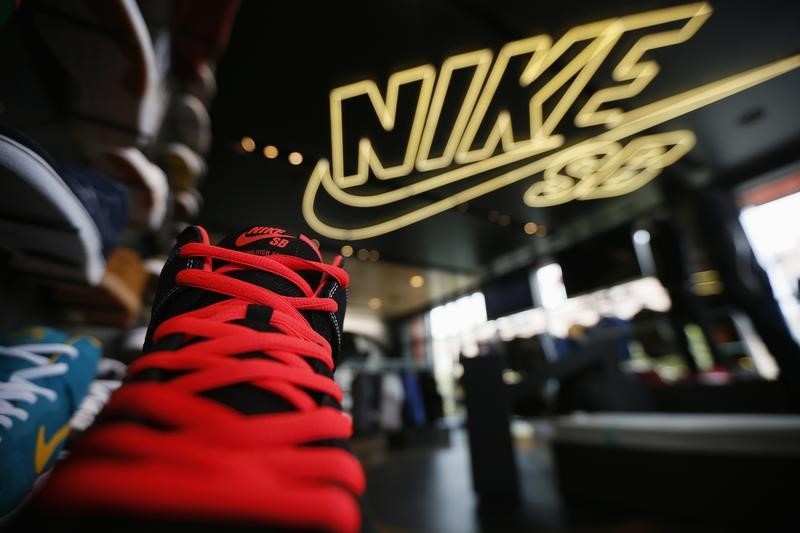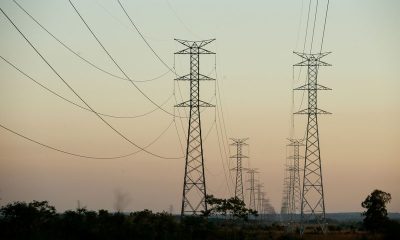Investing
Nike faces shareholder proposal on human rights

© Reuters. FILE PHOTO: A woman walks past a store of the sporting goods retailer Nike Inc at a shopping complex in Beijing, China March 25, 2021. REUTERS/Florence Lo
By Katherine Masters
NEW YORK (Reuters) – Activist shareholder platform Tulipshare is calling on Nike (NYSE:) to offer more transparency on working conditions in its supply chain.
In a shareholder proposal released Thursday, London-based Tulipshare requested a report from Nike on whether its policies effectively address its stated equity goals and human rights commitments.
The group, which owns 276 Nike shares and aims to help investors push for environmental and social commitments, asked Nike for information on the methodology and metrics used to track forced labor and wage theft risks.
The proposal also calls on Nike to consider implementing model supplier contracts developed by the American Bar Association and to assess whether its findings lead to changes in the company’s policies or decision-making.
“We now want Nike to be an industry leader and collaborate with their investors and stakeholders in identifying, assessing and avoiding actual or potential human rights abuses that may significantly disrupt their business, competitive advantage and the livelihoods of many workers,” a spokesperson for Tulipshare said in a statement.
Tulipshare said it submitted its proposal to Nike and the company confirmed receipt. A representative for Nike did not immediately respond to requests for comment.
The company’s most recently available impact report from fiscal 2021 cites forced labor, supply chain transparency and labor rights as some of its essential priorities.
The report states that 85% of facilities in Nike’s extended supply chain met its foundational labor, health, safety and environmental standards and the company now expects suppliers to develop and share internal codes of conduct.
Tulipshare, though, said Nike has failed to adequately disclose how it assesses the risk of Uyghur forced labor within its supply chain and cited ongoing labor complaints against the company.
A coalition of international garment worker unions and labor rights groups filed a complaint against Nike with the U.S. State Department in February, alleging that Nike violated guidelines from the Organization for Economic Co-operation and Development by triggering layoffs and pay cuts throughout the COVID-19 pandemic.
“Nike did not engage with garment worker unions representing Nike supply chain workers about those impacts, despite the OECD Guidelines’ expectation that multinational enterprises do so and despite unions’ requests for dialogue,” the complaint states.
A representative for Nike did not respond to a request for comment about the allegations. However, the company has previously stated that it does not source products from China’s Xinjiang region, where the Chinese government is reported to have established labor camps for ethnic Uyghur and other Muslim groups.
In a fiscal 2022 statement on forced labor, Nike said it is growing its business “through long-term relationships with suppliers that are committed to our strict standards of sustainability and human rights, product excellence and compliance with local laws.”
Read the full article here

-

 Make Money7 days ago
Make Money7 days agoHow to Create and Sell Digital Products Online (Make Extra Money)
-

 Investing7 days ago
Investing7 days agoIs Apple Releasing an ‘Ultra-Thin’ iPhone 17 Air? New Report
-

 Investing6 days ago
Investing6 days agoMoldova breakaway region to face new power cuts on Saturday, officials say By Reuters
-

 Investing7 days ago
Investing7 days agoUS data center electricity and water use to increase significantly by 2028: report By Investing.com
-

 Investing6 days ago
Investing6 days agoReebok Co-Founder Backs Syntilay’s New AI, 3D-Printed Shoe
-

 Side Hustles6 days ago
Side Hustles6 days agoHow to Survive High-Demand Seasons Without Losing Customers
-

 Passive Income7 days ago
Passive Income7 days agoHow to Evolve From Manager to Mentor and Create a Lasting Impact
-

 Side Hustles4 days ago
Side Hustles4 days ago5 Things That Could Significantly Impact Your Company in 2025


















